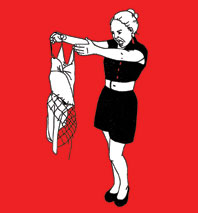
1. A Cabdriver Refuses to Take You to Brooklyn
Assuming you’re already in the car, refuse to get out. Then put the scare into him. Tell the driver, “You’re required by ordinance 2-50B of the Taxi and Limousine Commission Taxicab Drivers Rules to take me anywhere within the five boroughs.” Pull out your cell phone and start punching in his name and medallion number. If he still refuses, get out and call 311 to file a complaint with the TLC. Within ten business days you’ll receive a letter inviting you to testify in person or over the phone. Make sure you keep your appointment. If the cabbie is a no-show, he’ll most likely be found guilty in absentia and fined $200 to $350; if he’s on a third offense within three years, his license will be revoked.
Hassle Log
• Stressful cabbie confrontation: 5 mins.
• Call to 311: 5 mins.
• Court testimony: 30 mins.
• Total time: 40 mins.
Worth the effort?
Not really. Even if the ruling goes in your favor and the driver is hit with a fine, all you’ll get is a sense of righteousness.

2. Your Mugger is Arrested—and Now You Want Your Wallet and Money Back
Once the NYPD catches the goon, you’ll typically wait one day for an arraignment and then two or three days for the defense attorney to inspect your wallet as evidence. Then the police will mail you a property voucher, with instructions to go to the district attorney’s office and obtain a victim-property-release form. Your wallet could be in the arresting officer’s precinct, the precinct where you reported the crime, or one of the police storage facilities in the Bronx. Call around to find out. Rather than waiting months or years to see if the city prosecutor can prove in trial that the money’s yours and not the mugger’s, call the Crime Victims Board at 800-247-8035. There’s some arduous red tape involved to secure payment, but “if a physical injury is involved, we can reimburse cash up to $100, and property up to $500,” says John Watson, general counsel. The state-funded board also pays for counseling and lost work and has reimbursed in cases where the mugger was not arrested; it pays over $25 million a year.
Hassle Log
• Calls to the police: 45 mins.
• Trip to the D.A.’s office, mostly waiting in a stuffy lobby: 2 hrs.
• Visit to the police storage facility: 2 hrs.
• One call to the Crime Victims Board: 30 mins.
• Total time: 5 hrs. 15 mins.
Worth the effort?
If you were carrying a wad of cash and can somehow prove it in court, then yes. Otherwise, just go directly to the Crime Victims Board and cut your losses.

3. You Get a Fungus From a Nail Salon
From the moment your nails start getting gnarly, leave a paper trail. Save the pedicure receipt, take dated photos of your nail, make doctor’s appointments, and keep receipts from those. Choose what form of payment you want from the salon (you probably don’t want a year’s worth of free pedicures), and write a letter to the owner, including your paper trail and a request for compensation. If two weeks go by without a response, fill out a state-licensing-board complaint form (print from dos.state.ny.us/lcns/pdfs/1507.pdf), then return to the salon’s owner, saying you’ll file if you aren’t reimbursed. Businesses usually don’t want the hassle of getting reported.
Hassle Log
• Creating paper trail: 1 hr.
• Medical appointments: 2 hrs.
• Letter to the salon: 30 mins.
• Filling out state-licensing- board complaint: 30 mins.
• Total: 4 hrs.
Worth the effort?
Yes. By the time your toe fungus subsides, you should have been reimbursed.
4. You Lent a Friend $1,000, and Now She Won’t Take Your Calls
Stop by the free Manhattan Mediation Center (346 Broadway, nr. Leonard St.; 212-577-1740). A mediator will call your so-called friend and either resolve the dispute via phone or schedule an in-person meeting. The mediator may suggest both cash and noncash options. “Bartering makes sense for small amounts,” says mediator and psychotherapist Carol A. Butler. Your friend might babysit free of charge for a dozen Friday nights, or help you paint your living room. Get a written copy of the agreement, so the other party can’t forget what she agreed to. Still no dough? Haul your soon-to-be ex-friend into small-claims court. Print out the forms at courts.state.ny .us, and drop them at your local court along with the $15 filing fee. Bring along a copy of the original check, any written agreements, and a list of your friend’s known assets, such as cars or apartments. The arbitrator will hear your case with or without the other person present and can eventually issue a city lien against her property for up to $5,000.
Hassle Log
• Visit to the Manhattan Mediation Center: 2 hrs.
• Filling out small- claims-court forms: 1 hr.
• Court date: 30 mins.
• Total time: 3 hrs. 30 mins.
Worth the effort? If you value the friendship, no. “My gut reaction is to forget about it,” says Butler. But if the money’s more important to you, go for it.

5. You Are Injured by a Trainer
Fill out a health-club incident report (if the trainer’s affiliated with one), visit your doctor, and collect medical bills. Send the trainer or club a written request seeking payment for medical expenses. If the trainer is a gym employee, the club’s insurance company will likely want to close the matter with a small settlement, says lawyer Jonathan Minkoff, usually paying less than your medical expenses. You might be better off suing (lawyer’s fees are typically a third of the amount recovered). Your chances of winning are higher in cases of gross negligence—say, a trainer having you use a too-heavy barbell above your head.
Hassle Log
• Collecting medical documentation: 1 hr.
• Writing letter to club: 30 mins.
• Suing: 8 hrs.
• Total: 9.5 hrs.
Worth the effort? If the injury’s minor, perhaps not. If it’s significant, absolutely.
6. An ATM Doesn’t Spit Out the Right Amount of Cash
If you’re a customer of the bank that owns the ATM, walk into a branch to file a claim, or call the bank’s customer-care number (check the back of your card) to report the mishap. Ask to speak with the ATM-disputes department. The bank can determine where and when the transaction occurred with very little information. If you’re not a customer of the bank, file a claim with your own bank, which will research and resolve the claim. You’ll likely receive provisional credit during the investigation and full credit once it’s complete.
Hassle Log
• Call or visit to bank: 10 mins.
• Waiting for claim to be resolved: 2 days to a few wks.
• Total: Two days min.
Worth the effort?
Yes. While ATM errors are rare and it’s hard to prove a missing $20 or two, banks generally want to keep customers happy.
7. You Get Home From the Store and Realize You Were Charged Twice for the Same Item
Return to the store immediately and speak with the manager. If he leaves you empty-handed, bury him in phone calls. Call his supervisor, then the store’s regional and national headquarters, and repeat your complaint. If you used a credit card, call the 800 number on the back of your card and dispute the charge. Then stir up a storm of paperwork. File a complaint with the Department of Consumer Affairs at nyc.gov/consumers. A mediator will contact both sides, and if an agreement is not met—which is rare—schedule a hearing with an administrative-law judge. Then call the Better Business Bureau (212-533-6200) and file a complaint. By this point, the manager is fielding calls from two bureaus, a credit-card company, and multiple bosses. He’ll prefer to just pay you.
Hassle Log
• Calls to store manager and company supervisors: 2 hrs., at least half of it on hold.
• Filing out DCA paperwork: 1 hr.
• Complaining to Better Business Bureau: 1 hr.
• Total: 4 hrs.
Worth the effort?
It depends on how expensive the item was. Balance its cost against the four hours.
8. You Step on Your MetroCard, and it No Longer Works
If the card is a regular Pay-Per-Ride MetroCard, stop by a subway-station booth and ask the agent to transfer your money to a new card. If it’s too trashed for the agent to read it, mail it to the MTA using a pre-addressed, postage-paid envelope and questionnaire that you can pick up at any station booth (assuming they haven’t run out) or download at mta .info. If the card is an unlimited monthly MetroCard, mail it to NYC Transit for a replacement (if you paid with a credit card, call 212-638-7622 to have your account credited). The envelope has to be postmarked for the day after the MetroCard stopped working. A new card should arrive within three weeks.
Hassle Log
• Pick up envelope: 5 mins.
• Fill out form and mail defective card: 15 mins.
• Wait for new card to arrive via USPS: 3 wks.
• Total: 3 wks. and 20 mins.
Worth the effort?
Yes. It sure beats dropping another $81 for a monthly pass.

9. A Jilted Ex Puts Nude Photos of You, With Your Name, on an Amateur Porn Site
Sadly, posting nude photos is not a crime—unless they were stolen or “impersonated,” meaning the photos have your name and someone else’s body, says Diana Adams, a sexual-civil-rights attorney. If this is the case, call your local precinct. To get the photos taken down, find out your ex’s Internet-service provider, as well as the Website’s hosting company and domain registrant by going to whois .net. Call the contact numbers for all three and say, “The images were obtained without my knowledge or consent, are being used in bad faith, and this is a violation of federal copyright law.” (For future reference, all risqué pics should be shot with your own camera, so you can claim copyright.) Ben Butler, director of network abuse for GoDaddy .com, responds to 30 women with unwanted photos each week, and takes them down if they break federal copyright rule. If all fails, you can sue your ex—your chances are best if the photos are particularly lewd and accompanied by your name and contact information. The rub: Lawyers, jury, and judge will study the pics to evaluate exactly how embarrassing they are.
Hassle Log
• Calls to companies: 3 hrs.
• Suing: 8 hrs.
• Total: 11 hrs.
Worth the effort?
Oh yeah. Ensures that future romantic partners (or co-workers) won’t stumble on naked photos of you, and serves your ex with a whopping legal bill.

10. A Driver Hits You as You Cross the Street
In addition to filing a police report, immediately initiate a three-part insurance claim. The first claim goes to the driver’s insurance company (his policy may well be canceled, but it’s worth a try). Next, file with your own auto-insurance carrier—since New York is a no-fault state, your insurer must cover medical bills and lost wages if your first claim fails. If neither you nor anyone else under your roof—including spouses, parents, or roommates—owns a car, file a third claim within 180 days of the accident with New York’s Motor Vehicle Accident Indemnification Corporation (mvaic.com), which will cover doctor’s fees and lost earnings should none of your other claims pay. You may qualify for up to $25,000 for pain and suffering.
Hassle Log
• Filing police report: 5 mins. to a couple of hrs.
• Filing claim No. 1 (hitter’s insurance): 1 hr.
• Filing claim No. 2 (your insurance): 1 hr.
• Filing claim No. 3 (MVAIC): 5 mins.
• Wait for settlement: 30 days to 2 or more yrs.
• Total: A month at best, though insurance companies can push the wait to years.
Worth the effort?
Yes, absolutely. There’s no reason that you should suffer financially as well as physically.
11. Refrigerator Deliverymen Tear up Your Hallways
Stand in front of the door if you have to, but don’t let those guys leave. Get their manager on the phone and have the lead deliveryman speak to him as well, so there’s no confusion over what exactly happened. (Also note the collateral damage on the paperwork you sign.) Any good company should make repairs, says Tyrone Boone of Room & Board, a home-furnishings company. Or it will reimburse you for the cost of fixing the walls. If the store drags its feet or offers a paltry sum, cite the city’s Consumer Protection Law (specifically section 5-50). The threat of being reported should faze the store, but if not, file a complaint with the Department of Consumer Affairs by calling 311.
Hassle Log
• Call to the store: 20 mins.
• Waiting for reimbursement: 1 wk., if company is reputable; wks. or mos. if not.
• Call to DCA: 15 mins.
• Total: A few wks. min.
Worth the effort?
If the damage is extensive, yes. A new paint job can run into the hundreds. But for a few nicks and scratches, probably not.
12. Your Landlord Won’t Refund Your Security Deposit
Send biweekly letters to your landlord and save any written or voice-mail responses. After a few months, show up at her office and ask for proof of any damage and repair costs. When no proof materializes, haul her to small-claims court, suing for your deposit plus interest, up to $5,000 (you don’t need a lawyer). Print out the forms at courts.state.ny.us, and drop them at your local court along with the $20 filing fee. If your landlord’s a no-show at the ensuing court date, the judge will likely rule against her. If other tenants are having similar rent or deposit problems, contact the Consumer Fraud and Protection Bureau of the Attorney General’s Office (800-771-7755) and file a complaint, which could result in a much larger individual potential payout.
Hassle Log
• Bi-weekly letters to your landlord: 2 hrs.
• Personal visit to landlord: 1 hr.
• Filling out small- claims-court forms: 1 hr.
• Small-claims- court hearing: 30 mins.
• Total: 4.5 hrs.
Worth the effort?
Yes. You may only recoup your original deposit, but you’ll have won one for renters everywhere.

13. You Get Food Poisoning
Call 311 and use the phrase “suspected outbreak” to help speed along a Department of Health inspection. Next, call the restaurant’s manager and request reimbursement for your meal and medical costs. Not cooperating? Take them to small-claims court. Fill out the forms at courts.state.ny.us, and collect your evidence: a doctor’s letter outlining your illness and its cause, any medication required, meal receipts, and proof of missed work. “Ask for the maximum $5,000 amount,” says lawyer Jonathan Minkoff. “Judges are very favorable to individuals who come in well organized.”
Hassle Log
• Call to 311: 5 mins. • Pleading with restaurant manager: 20 mins.
• Filling out small-claims forms: 1 hr.
• Court hearing: 30 mins.
• Total Time: 2 hrs.
Worth the effort?
Yes. The potential four-figure payout is well worth two hours.
14. A Year After a Contractor Renovates Your Bathroom, the Wall Tiles Start Falling Off
Check your contract to see how long your contractor warranties his work. If it falls within the time limit, he should fix the problem for free. If he refuses responsibility, contact the Department of Consumer Affairs (call 311), which has the power to revoke the contractor’s license. The DCA’s formal mediation process, usually done by phone, can take weeks. If you’re at an impasse, or the contractor magically disappears, the DCA can dip into a housing trust that doles out up to $15,000 per claim. Even if the warranty is up (or the contractor isn’t licensed), you may still have some protection. According to the city’s Consumer Protection Law, a contractor can’t disclaim liability if his workmanship was shoddy. (Falling tiles a year after a renovation qualifies.) The city can seize an unlicensed contractor’s vehicle until he complies and gets a license.
Hassle Log
• Review of contract: 30 mins.
• Negotiation with contractor: 15 to 30 mins. (depending on how heated it gets)
• Call to 311: 15 mins.
• Waiting for arbitration or filing for repayment from DCA: 2 wks. to two mos. (or more)
• Total: Two wks. min.
Worth the effort?
Yes. You’ll need the money to pay a second contractor to fix the first one’s mistakes.

15. A Tailor Destroys Your New $400 Dress
Present the original receipt to the alterer and demand that he reimburse you. (If you don’t have a receipt, you might be stuck.) If you have the evidence but the tailor won’t pay, file in small-claims court. Look up the owner’s name on the state’s list of registered businesses (dos.state.ny.us). If the tailor, or any small-business owner, for that matter, doesn’t settle up when he receives his judgment notice, there’s one last strategy. You can do some detective work by seeking a court-issued information subpoena to figure out the tailor’s bank, then contact a local sheriff or marshal to go get the money. Keep in mind it’s a long shot. “Sometimes people make payments on their own,” says Joseph A. J. Gebbia, deputy chief clerk of Civil Court. “But if they don’t, and you don’t know where their money is, it’s difficult to collect.”
Hassle Log
• Arguing with tailor: 15 mins.
• File claim: 20 mins.
• Wait for court appearance: 4 to 6 wks.
• Court appearance: 30 mins.
• Bank-account search: Could be hrs., could be days
• Total: 4 wks. min.
Worth the effort?
Given the amount of time required, probably not.